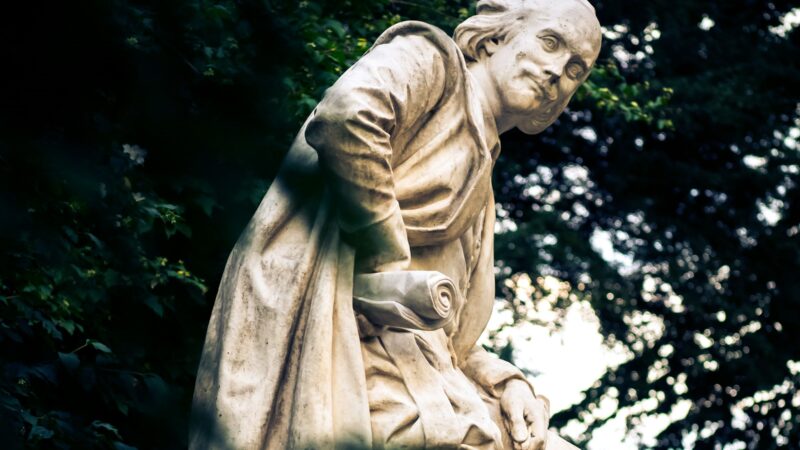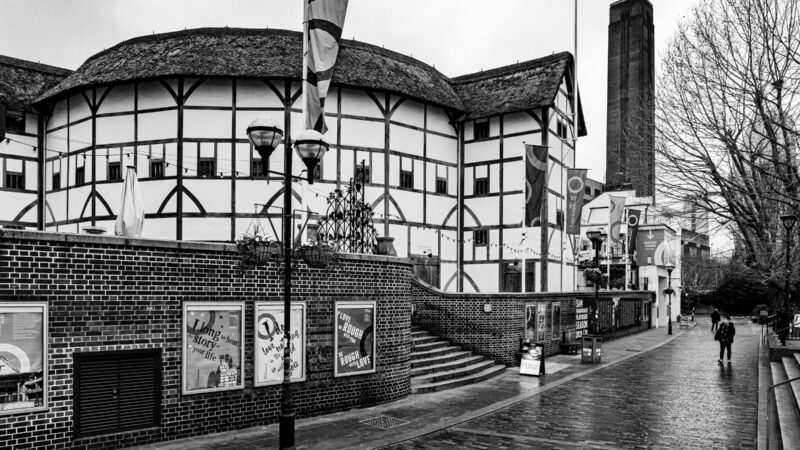Joel Coen’s The Tragedy of Macbeth: An Examination and Review
A new film adaptation of Shakespeare’s Scottish tragedy, Joel Coen’s 2021 The Tragedy of Macbeth is the director’s first production without his brother Ethan’s involvement. Released in select theaters on December 25, 2021, and then on Apple TV on January 14, 2022, the production has received positive critical reviews as well as awards for screen adaptation and cinematography, with many others still pending.
As with any movie review, I encourage readers who plan to see the film to do so before reading my take. While spoilers probably aren’t an issue here, I would not want to unduly influence one’s experience of Coen’s take on the play. Overall, though much of the text is omitted, some scenes are rearranged, and some roles are reduced, and others expanded, I found the adaptation to be a generally faithful one that only improved with subsequent views. Of course, the substance of the play is in the performances of Denzel Washington and Frances McDormand, but their presentation of Macbeth and Lady Macbeth is enhanced by both the production and supporting performances.
Production: “where nothing, | But who knows nothing, is once seen to smile” —IV.3
The Tragedy of Macbeth’s best element is its focus on the psychology of the main characters, explored below. This focus succeeds in no small part due to its minimalist aesthetic. Filmed in black and white, the play utilizes light and shadow to downplay the external historical conflicts and emphasize the characters’ inner ones.
Though primarily shown by the performances, the psychological value conflicts of the characters are concretized by the adaptation’s intended aesthetic. In a 2020 Indiewire interview, composer and long-time-Coen collaborator Carter Burwell said that Joel Coen filmed The Tragedy of Macbeth on sound stages, rather than on location, to focus more on the abstract elements of the play. “It’s more like a psychological reality,” said Burwell. “That said, it doesn’t seem stage-like either. Joel has compared it to German Expressionist film. You’re in a psychological world, and it’s pretty clear right from the beginning the way he’s shot it.”
This is made clear from the first shots’ disorienting the sense of up and down through the use of clouds and fog, which continue as a key part of the staging throughout the adaptation. Furthermore, the bareness of Inverness Castle channels the focus to the key characters’ faces, while the use of odd camera angles, unreal shadows, and distorted distances reinforce how unnatural is the play’s central tragic action, if not to the downplayed world of Scotland, then certainly to the titular couple. Even when the scene leaves Inverness to show Ross and MacDuff discussing events near a ruined building at a crossroads (Act II.4), there is a sense that, besides the Old Man in the scene, Scotland is barren and empty.
The later shift to England, where Malcolm, MacDuff, and Ross plan to retake their homeland from now King Macbeth, further emphasizes this by being shot in an enclosed but bright and fertile wood. Although many of the historical elements of the scene are cut, including the contrast between Macbeth and Edward the Confessor and the mutual testing of mettle between Malcolm and MacDuff, the contrast in setting conveys the contrast between a country with a mad Macbeth at its head and the one that presumably would be under Malcolm. The effect was calming in a way I did not expect—an experience prepared by the consistency of the previous acts’ barren aesthetic.
Yet, even in the forested England, the narrow path wherein the scene takes place foreshadows the final scenes’ being shot in a narrow walkway between the parapets of Dunsinane, which gives the sense that, whether because of fate or choice rooted in character, the end of Macbeth’s tragic deed is inevitable. The explicit geographical distance between England and Scotland is obscured as the same wood becomes Birnam, and as, in the final scenes, the stone pillars of Dunsinane open into a background of forest. This, as well as the spectacular scene where the windows of the castle are blown inward by a storm of leaves, conveys the fact that Macbeth cannot remain isolated against the tragic justice brought by Malcom and MacDuff forever, and Washington’s performance, which I’ll explore presently, consistently shows that the usurper has known it all along.
This is a brilliant, if subtle, triumph of Coen’s adaptation: it presents Duncan’s murder and the subsequent fallout as a result less of deterministic fate and prophecy and more of Macbeth’s own actions and thoughts in response to it—which, themselves, become more determined (“predestined” because “wilfull”) as Macbeth further convinces himself that “Things bad begun make strong themselves by ill” (III.2).
Performances: “To find the mind’s construction in the face” —I.4
Film adaptations of Shakespeare can run the risk of focusing too closely on the actors’ faces, which can make keeping up with the language a chore even for experienced readers (I’m still scarred from the “How all occasions” speech from Branagh’s 1996 Hamlet); however, this is rarely, if ever, the case here, where the actors’ and actresses’ pacing and facial expressions combine with the cinematography to carry the audience along. Yet, before I give Washington and McDormand their well-deserved praise, I would like to explore the supporting roles.
In Coen’s adaptation, King Duncan is a king at war, and Brendan Gleeson plays the role well with subsequent dourness. Unfortunately, this aspect of the interpretation was, in my opinion, one of its weakest. While the film generally aligns with the Shakespearean idea that a country under a usurper is disordered, the before-and-after of Duncan’s murder—which Coen chooses to show onscreen—is not clearly delineated enough to signal it as the tragic conflict that it is. Furthermore, though many of his lines are adulatory to Macbeth and his wife, Gleeson gives them with so somber a tone that one is left emotionally uninvested in Duncan by the time he is murdered.
Though this is consistent with the production’s overall austerity, it does not lend much to the unnaturalness of the king’s death. One feels Macbeth ought not kill him simply because he is called king (a fully right reason, in itself) rather than because of any real affection between Macbeth and his wife for the man, himself. However, though I have my qualms, this may have been the right choice for a production focused on the psychological elements of the plot; by downplaying the emotional connection between the Macbeths and Duncan (albeit itself profoundly psychological), Coen focuses on the effects of murder as an abstraction.
The scene after the murder and subsequent framing of the guards—the drunken porter scene—was the one I most looked forward to in the adaptation, as it is in every performance of Macbeth I see. The scene is the most apparent comic relief in the play, and it is placed in the moment where comic relief is paradoxically least appropriate and most needed (the subject of a planned future article). When I realized, between the first (ever) “Knock, knock! Who’s there?” and the second, that the drunk porter was none other than comic actor Stephen Root (Office Space, King of the Hill, Dodgeball), I knew the part was safe.
I was not disappointed. The drunken obliviousness of Root’s porter, coming from Inverness’s basement to let in MacDuff and Lennox, pontificating along the way on souls lately gone to perdition (unaware that his king has done the same just that night) before elaborating to the new guests upon the merits and pitfalls of drink, is outstanding. With the adaptation’s other removal of arguably inessential parts and lines, I’m relieved Coen kept as much of the role as he did.
One role that Coen expanded in ways I did not expect was that of Ross, played by Alex Hassell. By subsuming other minor roles into the character, Coen makes Ross into the unexpected thread that ties much of the plot together. He is still primarily a messenger, but, as with the Weird Sisters whose crow-like costuming his resembles, he becomes an ambiguous figure by the expansion, embodying his line to Lady MacDuff that “cruel are the times, when we are traitors | And do not know ourselves” (IV.2). In Hassell’s excellent performance, Ross seems to know himself quite well; it is we, the audience, who do not know him, despite his expanded screentime. By the end, Ross was one of my favorite aspects of Coen’s adaptation.
The best part of The Tragedy of Macbeth is, of course, the joint performance by Washington and McDormand of Macbeth and Lady Macbeth. The beginning of the film finds the pair later in life, with presumably few mountains left to climb. Washington plays Macbeth as a man tired and introverted, which he communicates by often pausing before reacting to dialogue, as if doing so is an afterthought. By the time McDormand comes onscreen in the first of the film’s many corridor scenes mentioned above, her reading and responding to the letter sent by Macbeth has been primed well enough for us to understand her mixed ambition yet exasperation—as if the greatest obstacle is not the actual regicide but her husband’s hesitancy.
Throughout The Tragedy of Macbeth their respective introspection and ambition reverse, with Washington eventually playing the confirmed tyrant and McDormand the woman internalized by madness. If anyone needed a reminder of Washington and McDormand’s respective abilities as actor and actress, one need only watch them portray the range of emotion and psychological depth contained in Shakespeare’s most infamous couple.
Conclusion: “With wit enough for thee”—IV.2
One way to judge a Shakespeare production is whether someone with little previous knowledge of the play and a moderate grasp of Shakespeare’s language would understand and become invested in the characters and story; I hazard one could do so with Coen’s adaptation. It does take liberties with scene placement, and the historical and religious elements are generally removed or reduced. However, although much of the psychology that Shakespeare includes in the other characters is cut, the minimalist production serves to highlight Washington and McDormand’s respective performances. The psychology of the two main characters—the backbone of the tragedy that so directly explores the nature of how thought and choice interact—is portrayed clearly and dynamically, and it is this that makes Joel Coen’s The Tragedy of Macbeth an excellent and, in my opinion, ultimately true-to-the-text adaptation of Shakespeare’s Macbeth.



